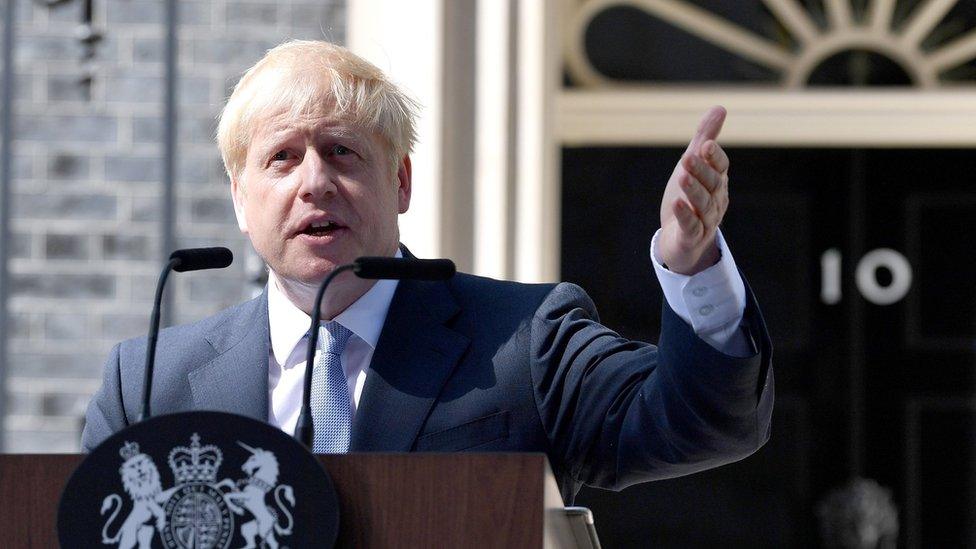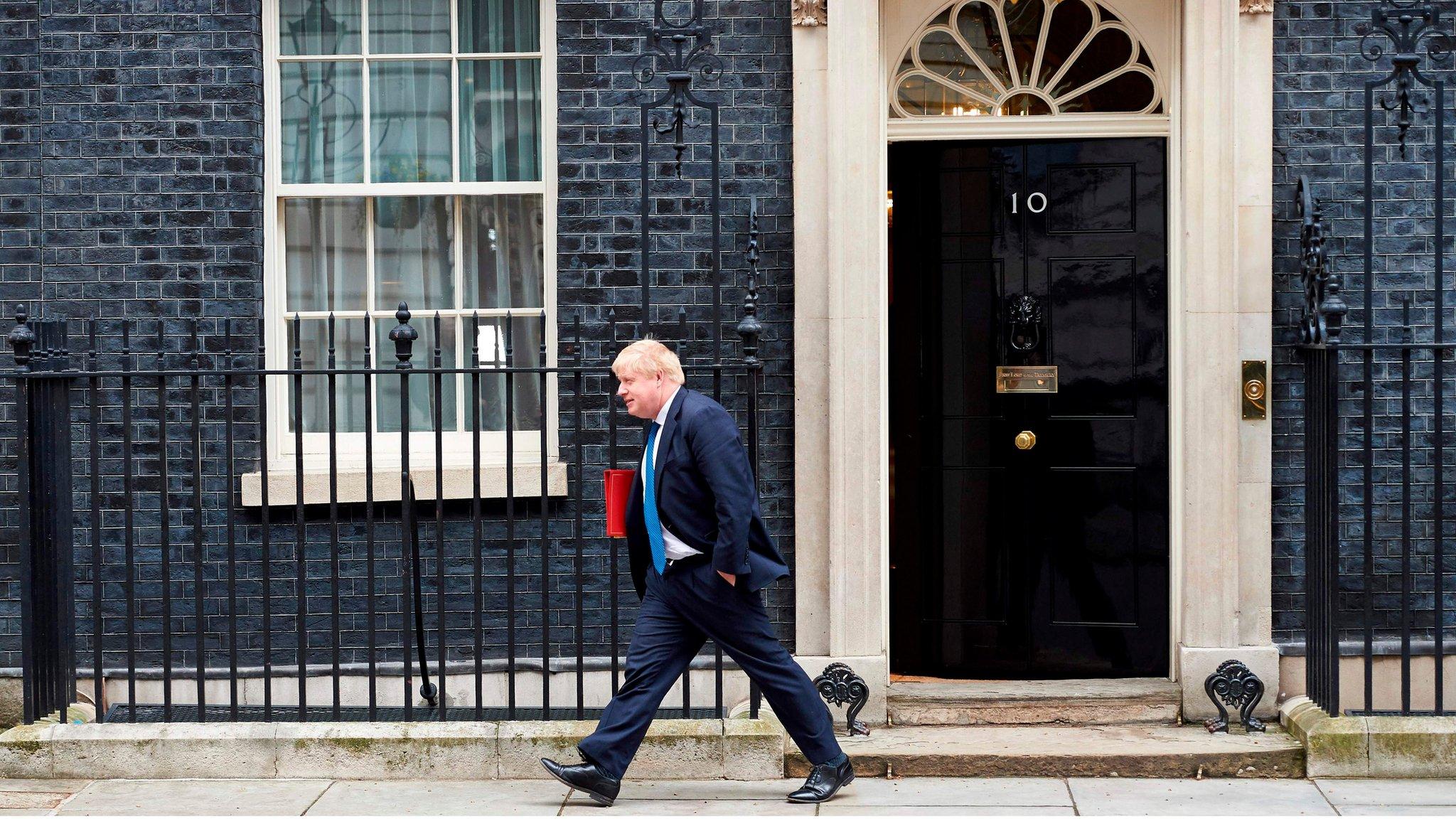Do Boris Johnson's tax and spending plans add up?
- Published

Boris Johnson has made a series of spending promises both before and after becoming prime minister. How much would all of this cost?
No-deal preparations
The plan: Immediate funds to help prepare the UK for a possible no-deal Brexit on 31 October.
What it means: Just over a week after Mr Johnson become prime minister, the Treasury announced that £2.1bn would be spent bolstering border and customs operations, stockpiling critical medical supplies and supporting UK nationals abroad. Money will also be spent on a public awareness campaign ahead of a possible no-deal Brexit outcome.
The cost: Ramping up no deal preparations will cost £2.1bn. This is on top of the £4.2bn Theresa May's previous government had already allocated on preparing for Brexit, external - with or without a deal.
In total, the Treasury has now made £6.3bn available since 2016.
Money for hospitals
Today I’m delivering on this promise with a £1.8bn cash injection – meaning more beds, new wards, and extra life-saving equipment.
The plan: £1.85bn for upgrades and new equipment at hospitals in England.
What it means: The funding, external is divided into two parts - £1bn will be available immediately to fund existing upgrade projects and tackle urgent needs.
The Nuffield Trust has argued that this £1bn is money that NHS providers were promised in return for making savings over the past three years and then told they couldn't spend.
But it is nonetheless a pot of money that the NHS did not have available to spend before this announcement, which it now can spend.
The other £850m will be shared over the next five years between 20 hospitals in England to fund things like a new adult mental health inpatient unit in Manchester and four new hospital wards in Norwich.
The cost: Successive governments have failed to spend the amount they said they would on capital projects, but if this government does manage to spend the full £1.85bn over five years, the Barnett formula would also require it to allocate £180m for Scotland, £110m for Wales and £60m for Northern Ireland, taking the total to £2.2bn.
Lots more police officers
My job is to make your streets safer – and we are going to begin with another 20,000 police on the streets
The plan: Hire an extra 20,000 police officers by 2022.
What it means: There are 122,000 police officers in England and Wales, down from 143,000 in 2010 when Theresa May became home secretary.
Mr Johnson repeated in Downing Street his plan to reverse almost all of those cuts.
There has been some dispute about the link between police numbers and levels of violent crime, with Theresa May saying there was not a direct link.
But Metropolitan Police Commissioner Cressida Dick has said there is "some link" between the two.
The cost: Mr Johnson has given a figure of £1.1bn.
For police officers outside London, the lowest pay, external was about £25,400 in 2016 (although this differs from force to force).
That comes to £500m a year but these costs will increase once they complete training, which takes about two years.
Typically, after four years, the pay will increase to £33,700 (again outside London) - so almost £700m but this doesn't account for training costs.
The Nottinghamshire police force, external estimated recruitment and training to be about £13,000 per officer in 2012 (not including salary received during training).
This would come in at about £258m for 20,000 new officers but again this would differ from force to force.
Conservative MP Kit Malthouse, who supports Mr Johnson, says part-time special constables, who already have police training, would be recruited to become police officers, to help alleviate training costs.
New prison places
By the end of the programme in the mid-2020s we'll have delivered about 13,500 extra prison places.
The plan: Create an extra 10,000 prison places in England and Wales.
What it means: Michael Gove announced, external the building of 10,000 new prison places in 2015 and it was a commitment in the Conservative Party's manifesto for the 2017 election.
Justice Secretary Robert Buckland has now told BBC News that the government is only planning to create about 3,500 of those and that the extra 10,000 will start from now - so about 6,500 of the previously announced places have clearly been scrapped.
"By the end of the programme in the mid-2020s we'll have delivered about 13,500 extra prison places," he said.
The first new prison will be built at HMP Full Sutton in Yorkshire where there is already a maximum security prison. The new prison at Full Sutton was previously announced in 2017.
The cost: The programme is supposed to cost "up to £2.5bn" by the mid-2020s. That's the cost of building or refurbishing cells, not the ongoing cost of running them, which has not yet been announced.
The justice secretary maintains that "this is new money", but it is not clear how much of the £1.3bn previously allocated to building 10,000 new prison places has been spent so far.
If £2.5bn is actually spent then under the Barnett formula about an extra £300m would need to be allocated to Scotland and Northern Ireland.
Full-fibre broadband
Safer streets and better education and fantastic new road and rail infrastructure and full-fibre broadband
The plan: It is currently government policy, external to have full-fibre broadband across the UK by 2033 - Mr Johnson says he will have it done by 2025.
What it means: Having full-fibre broadband means getting high-speed optical cables going into buildings so there is no use of copper cables.
The telecoms regulator Ofcom said, external that in May only 7% of UK properties had full-fibre broadband.
Increasing that to 100% in six years would be a big project and there has been no detail so far of how Mr Johnson plans to do it.
The cost: Mr Johnson has said that government money would be needed to make this happen but has not specified how much.
Commercial operators could be expected to fund this work in densely populated areas where they could expect to get a decent rate of return. But in more remote areas, there may have to be government subsidies.
The government's current plan, external estimates that getting full-fibre broadband to the most remote 10% of properties will require it to spend between £3bn and £5bn - it is reasonable to assume that doing it in six years instead of 14 years would increase that cost.
Figures of about £30bn have been cited but it is not clear how much of that would be government money and how much would come from commercial investment.
Cash for schools
We are going to level up per pupil funding in primary and secondary schools
The plan: Level up per pupil funding in primary and secondary schools in England
What it means: Mr Johnson wants to make sure per pupil funding is at least £5,000 in secondary schools across the country.
He also said he wanted to increase funding in primary schools.
And there were hints during the leadership campaign that he would reverse previous cuts to school spending, which would be considerably more expensive.
MPs on the education select committee said that "a multi-billion cash injection" was needed.
The cost: Taking per pupil funding to £5,000 in secondary schools would be relatively cheap - about £50m a year.
Reversing previous cuts to spending was estimated during the campaign to cost about £4.6bn, although teaching unions have said that schools need an extra £12.6bn.
Raise higher income tax band
We should be raising thresholds of income tax – so that we help the huge numbers that have been captured in the higher rate by fiscal drag
The plan: Raise the higher income tax rate from £50,000 to £80,000.
What it means: At the moment, individuals have to pay 40% income tax on any earnings above £50,000, external. So, a person earning £55,000 a year, pays 40% on £5,000.
Under Mr Johnson's plan - outlined during the leadership campaign but not set out in detail since - the point at which the 40% higher rate kicks in would be raised to £80,000. This would not benefit Scottish workers because the Scottish government sets its own income tax rates and bands.
Mr Johnson also wants to raise the point at which people start paying National Insurance, absorbing some of the cost by also raising the point at which they stop paying NI.
National Insurance is a separate tax. It's paid for by workers and companies and is meant to fund state benefits, such as the NHS.
Under this new tax regime, someone earning £60,000 a year could benefit by £1,000 a year, while someone on £80,000 or more would gain a maximum of £3,000 (because some of the benefits would be lost because of National Insurance increases).
But it's wealthy pensioners who stand to benefit the most - up to £6,000 each, according to analysis from the Institute for Fiscal Studies (IFS). That's because pensioners don't pay National Insurance to begin with.
So, if someone already receives a generous work pension, not only would they be subject to less income tax (up to the new threshold), they also would not be affected by the changes to National Insurance.
The cost: Changing the tax system in this way would cost about £10bn a year, according to Mr Johnson. He says the bill could be funded from £26.6bn of "fiscal headroom".
This "headroom" refers to government borrowing, which came in lower than originally expected and had been earmarked by the chancellor for no-deal Brexit planning.
However, if Mr Johnson chooses to fund his tax changes with this £26.6bn, it would not amount to a permanent solution. That's because the money can be spent once only.
So, to pay for the policy in the long term, Mr Johnson would need to raise taxes elsewhere, announce spending cuts or continue to fund it from government borrowing.
Cut tax rate on company profits
Every time corporation tax has been cut in this country it has produced more revenue
The plan: Mr Johnson has spoken favourably about cutting corporation tax but has not been specific about how much he would like to cut it by.
What it means: The corporation tax rate, which is the tax companies pay on their profits, has been cut from 28% in 2010 to the current rate of 19%. It is due to fall again, to 17%, next year.
While the other candidate in the leadership election, Jeremy Hunt, wanted to cut the rate further to 12.5%, Mr Johnson was not as specific.
The cost: Mr Johnson claimed at a hustings in Darlington that every time corporation tax has been cut in this country, the amount of revenue raised has increased.
That is not the case. While there have been occasions since 2010 when corporation tax has been cut and revenue has risen, in the years after the rate was cut in 2008, revenue fell.
The government currently estimates that an extra one percentage point cut in corporation tax would cost £3.1bn in 2022-23.
In the longer term, some of that money would be clawed back in extra investment, wages or consumption.


- Published23 July 2019
